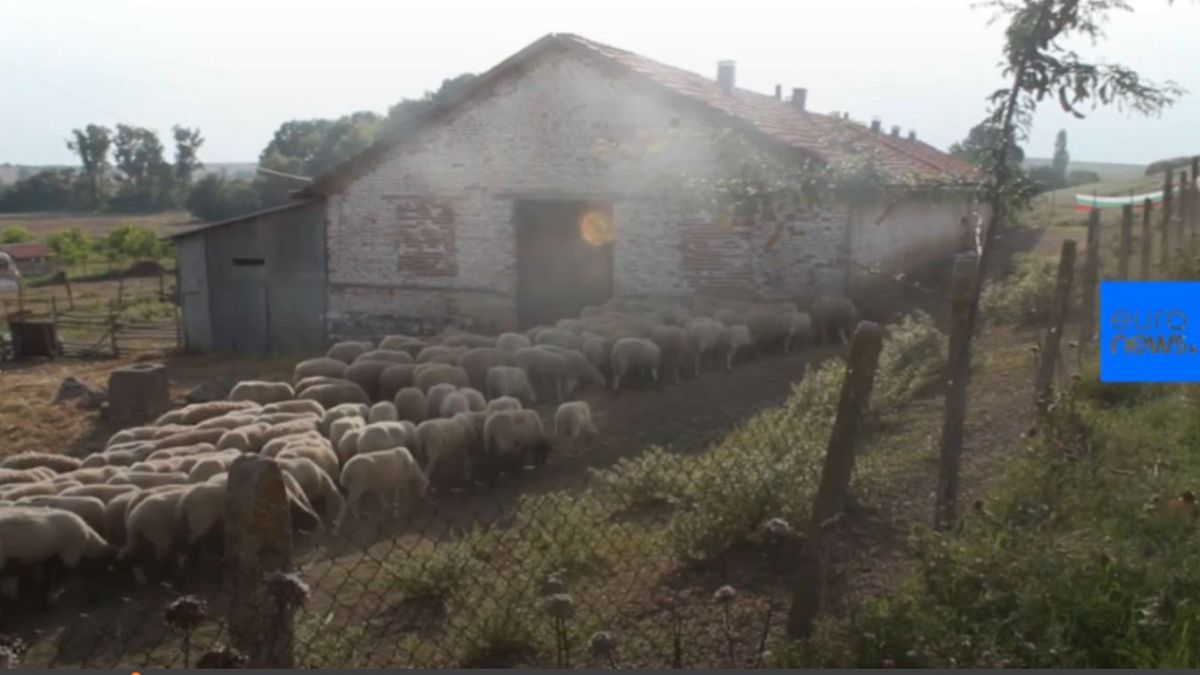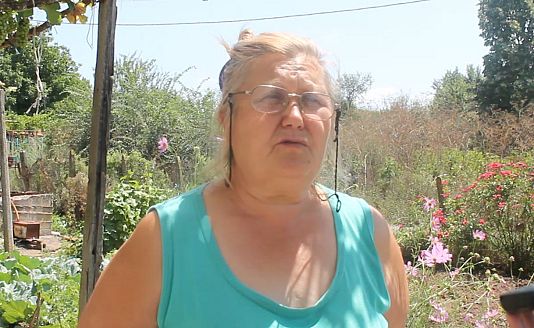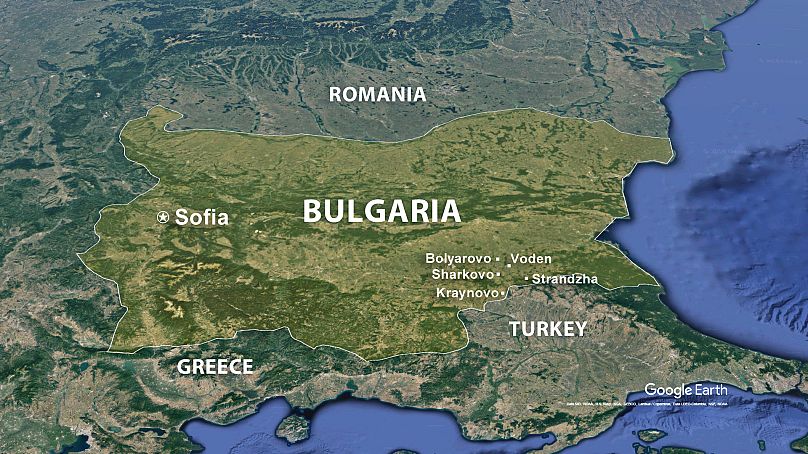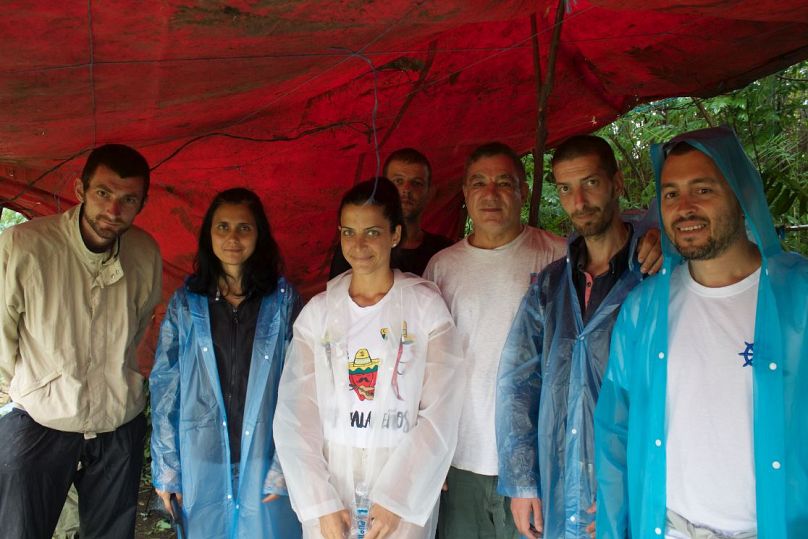The Bulgaria government has ordered a mass slaughter of livestock following the first outbreak in the European Union of the so-called sheep and goat plague. Euronews spoke to farmers who were devastated.
Baba Tzveta was at work in the kitchen of a retirement home when her husband told her bulldozers and a group of veterinarians had arrived in their village of Voden, Bulgaria unannounced.
She knew why they were there. They had come for her animals. Later that day, all 126 of her sheep, including 51 lambs were euthanised and buried in a mass grave on the edge of the village.
“We take care of them as our little children, do you understand?,” Tzveta, who did not to use her last name, said in the present tense, “ we are with them all the time, all day, all night, weekends and holidays. We look after them and they look after us.” Tzveta said the milk produced by these sheep served as an important source of income for the elderly couple, on top of the €260 she earns per month as a chef.
The village of Voden, Bulgaria has been ground zero for the EU’s first outbreak of ovine rinderpest, also known as ‘sheep and goat plague’.
One of Tzveta’s animals died unexpectedly last month and another grew sick but survived, however, both animals returned negative test results for ovine rinderpest.
The authorities offered a partial payment for Tzveta’s sheep, of around 190 leva (€97) per ewe, slightly under market value. She has also been told their farm is not permitted to raise livestock for 6 months.
Threats of EU restrictions on the export of dairy products have encouraged the Bulgarian government to euthanise more than 4,000 sheep and goats in villages close to the Turkish border.
Some experts say ovine rinderpest can lead to an 80% mortality rate of a sheep herd and a 100% mortality rate among goats in a matter of a week.
The first positive test results in Voden were confirmed by the French agricultural lab CIRAD on 23 June. These animals belonged to Yordan Trifonov, who ended up losing all 300 of his sheep in the culling which followed the positive results. Yordan, 50, told Euronews a local veterinarian reported disease-like symptoms in two of his sheep, one of which died, while the other survived.
“I have never doubted the blood test results, I trust the authorities, there was a chance of disaster if the disease spread throughout the entire country,” said Yordan.
Yordan confirmed that his infected animal most likely came from Turkey, where it is legal to vaccinate livestock, unlike in the European Union. Vaccination can hide symptoms and allow the disease to spread without killing animals.
After Voden, the neighboring village of Sharkovo was quarantined in order to slaughter the animals and fully disinfect the town. Among the casualties, there were 586 sheep and 24 goats that belonged to Dochka Panayotova.
“We had no information, no communication,” Dochka, 50, told Euronews alongside the mayor of Sharkovo, which currently has a population of 193.
“What kind of Europe is this?” they both asked simultaneously.
“We are looking for help now,” Dochka continued, “the reports show 31 less animals than I own, this is more than 10,000 leva (€5,100) they are taking away from me.” Dochka said she will not sign any documents offered to her regarding her livestock until this is resolved.
The European Commission says measures to fully compensate animal owners for their losses are in place and the owners are eligible for EU financial support at a rate of 75%.
“The doctors are now saying that my 31 missing animals died from plague, but I know they didn’t, and I have proof. I am under an EU program and if these animals were dead, I needed to tell the doctor to take them out from the record,” said Dochka.
Dozens of Bulgarians have rallied together in Bolyarovo in support of these devastated farmers. Bolyarovo is the largest of the five villages effected by the outbreak scare and has become the last refuge for livestock in the area.
The supporters say they are not politically motivated but do not believe the government is telling the truth about the plague outbreak. They say they want a clear line of communication with the decision makers in Sofia and believe healthy animals should not be killed.
Bolyarovo is home to 41-year-old Ana Petrova, who is desperately holding out hope that her 203 sheep will be spared. At the entrance to her farm, police check ID’s of supporters entering, and on the way out, cars are disinfected with chlorine.
“I think there are better options, says Petrova, this is pressure and stress we as farmers don’t need. We wanted a dialogue with the doctors, the same doctors which we trusted before. But the secretive way they are handling things makes me doubt there is any disease at all.” Petrova says she has been told a second round of blood tests will be done on her sheep next week.
Multiple veterinarians involved in euthanising the livestock declined a call for comment from Euronews.
The European Commission for Health and Food Safety told Euronews they have a very strict policy for Ovine rinderpest and other similar diseases of the same magnitude. A spokesperson for Commission says they have been in contact with Bulgarian authorities since the beginning, encouraging Bulgaria to take the necessary containment and eradication measures, including drastic movement restrictions for sheep and goats and their products.
The Commission wants to ensure the containment of the virus by applying very strict regionalisation, to protect the disease-free area of Bulgaria and the rest of the EU.
The Bulgarian Ministry of Agriculture, Food and Forestry said in a statement that as an EU member state, Bulgaria can legally institute animal vaccines if it is in the essential interests of the community it is affecting. However, it comes at a great economic cost, as a ban on live animal trade and the exportation of meat and dairy products for at least two years would follow the decision.



